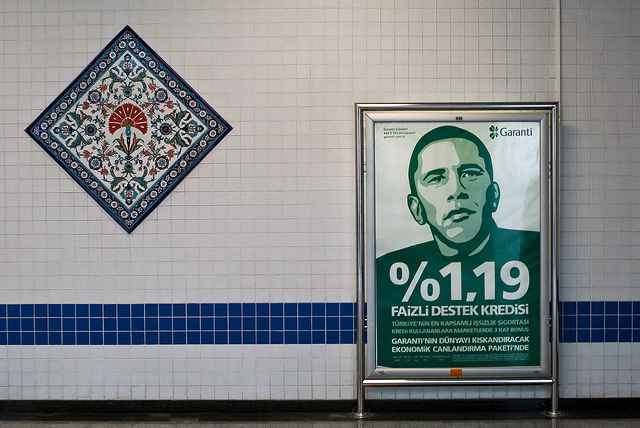Barring a surprise turnaround in America’s leadership contest, Barack Obama is going to enter his second term in the Oval Office. Tellingly, his campaign has not focused on foreign policy. Yet, when Obama has discussed it, it has been to trump his record against challenger Mitt Romney. Yet, there have been no hints as to what his foreign policy will look like in a second term.
Second term presidents are generally able to act more boldly, especially in foreign policy, where they have considerably more control and leeway than they do in domestic policy.
A number of pundits have expressed the hope that this will mean that Obama will be more inclined to act more forcefully in the Middle East, particularly with regard to Israel. There are some reasons to believe that he will, and many others to believe he will not.
Thus far, since the outbreak of the Arab Spring nearly two years ago, Obama has largely taken a “wait-and-see” approach to developments in the Arab world. This is the far more prudent course than the reactionary desires of many Republicans and some so-called “liberal hawks,” who are arguing for intervention in some cases (most notably Syria, these days) and for increasing hostility in others (particularly Egypt.) Obama’s administration has displayed a certain understanding that if the populations of Arab countries gain more of a voice, there will be some anti-American sentiment in that voice. After all, we destroyed Iraq, have supported a long line of Arab dictators, continue to kill civilians with drones, and, not to be forgotten, have aided and abetted Israel’s dispossession and denial of rights to Palestinians for decades.
The US is not going to suddenly reverse its behavior, of course, but neither can it afford to alienate every country where the Arab Spring revolts have taken hold. Obama also recognizes that, despite the attacks on and protests at US embassies, the new Egyptian, Tunisian, Libyan and other governments continue to work to balance political forces in their countries with their interest in maintaining relationships with the United States. But he also faces growing resentment in Congress over giving aid to countries where people are expressing so much hostility toward the US, with the most extreme example being the opportunistic attack on the US embassy in Benghazi, Libya, where, apparently, an extremist group took advantage of the angry protests over a hateful anti-Islam film to kill the US ambassador. This is a difficult tightrope, but one a US President has to walk if he doesn’t want to drastically reduce the already declining US influence in the Arab world.
This is probably as good an approach as one can expect, given the political circumstances the US is dealing with. It’s one Romney almost certainly would bungle, as he has so many things in his campaign. So, this much at least is promising.

But the overriding issue for the US in the Middle East remains unchanged: our support for Israel’s occupation and its decades-long denial of basic civil and human rights to millions of Palestinians. Here, there are some intriguing possibilities, but it’s also where Obama would have to spend considerable political capital to get things done. And that seems unlikely, as he will have more pressing places to spend it domestically.
We can start with the unprecedented and appalling level to which Israeli Prime Minister Benjamin Netanyahu has worked to oppose Obama’s re-election. He has, apparently, learned nothing from his attempts to add fuel to the fires surrounding Bill Clinton in the late 1990s. That attempt failed and ended up costing Bibi his office, much like a similar failure, on a smaller scale, did to Yitzhak Shamir earlier in the decade.
Clinton subtly made clear his disdain for Netanyahu back then, and it was enough to convince Israelis that Bibi was unable to handle Israel’s most important relationship. This time around, though, Israelis are more apt to blame Obama than Bibi, although the overwhelming sentiment still seems to be that Bibi has done a poor job at this again.
But Obama is unlikely to take Bibi’s effort to unseat him lying down. Whatever his personal anger, which is likely considerable, Obama will find other obstacles if he simply allows Bibi to walk all over him like this. It was one thing when he was first in office, facing Republican assaults and then running for a second term. But if his passivity continues, he will lose face among world leaders now that he will be in a second term. But whatever steps Obama takes will be directed squarely at Netanyahu, and not at Israel’s general standing, just as was the case with Clinton and George H.W. Bush.
Obama will look for ways to discredit Netanyahu without forcing fundamental change in Israel’s positions, because those positions are too popular among Democrats. Obama cannot afford anything less than total Democratic support in his second term. And Congressional Democrats can ill afford to be seen as anything less than completely supportive of Israel.
Obama will need unity in his party because he will still be facing a hostile Congress. While current polls project that the Democrats will maintain a razor thin majority in the Senate, they predict only modest gains in the House of Representatives, which will remain quite firmly in Republican hands. If a President is determined to get enough cooperation from Congress, even a hostile one, for foreign policy moves, he can usually do it. But Obama is not going to be able to spend that kind of political capital on foreign policy while he tries to take action to cement a legacy as the President who brought the country out of the biggest economic crisis since the Great Depression. That is where he will try to place his efforts.
Obama will thus be limited in his options in a second term when it comes to his Middle East policy. Even early on, his statements over the past year will soon be creating a lot more pressure for military action against Iran, unless an agreement can be worked out with the Iranians, a prospect which seems unlikely right now. As his term goes on, whether or not the Iran issue is resolved, there will also be growing pressure for US action to allay Israeli fears over the Arab Spring, which Israel is likely to characterize as a rise of radicalism, leaving the “embattled” Jewish state surrounded by Muslim Brotherhood leadership in Egypt, Muslim Brotherhood-spawned leadership in Gaza, Hezbollah to the north and either a post-Assad leadership in Syria (which could very well also be a Muslim Brotherhood-led government) or an Assad government that will be slavishly loyal to Iran and will not soon forget the Israeli and American statements spelling out Assad’s many crimes.
In that context, it will be all Obama can do to make Netanyahu look bad. He will not be able to do anything about the late, unlamented “peace process” with the Palestinians without picking a tumultuous fight with Congress and the Israel Lobby that intimidates and convinces it to their side. Hoping for more, especially with a fractured Palestinian leadership, is hope that is doomed to frustration.
Obama’s victory should still be celebrated, if for no other reason than Romney would have returned the neoconservatives into office who made a terrible Middle East situation enormously worse. And Obama, being less emotionally attached to Israel than Bill Clinton was, may well plant some seeds for some kind of notable change in the US discourse in the future. Indeed, this is where energy should be devoted during his second term.
A new paradigm will be needed to replace the failed Oslo Process. It will need to be a rights-based discourse, where Jewish and Arab rights are militantly held as equivalent. And, as I suggested recently, the focus needs to be on shifting the discussion within the Democratic Party and capitalizing on the Republican effort to turn Israel into a wedge issue. That needs to be seized upon and expanded, so that the two parties represent a real debate on our policy, rather than a lock-step, bipartisan consensus.
There also needs to be attention paid to ensuring that Obama does not repeat Clinton’s most grievous error: trying to make a dramatic move at the very end of his term. Clinton’s Camp David II idea was doomed to fail from the first because it was slapped together too quickly and without proper political groundwork in either Israel or, to a far greater extent, Palestine. But the fact that Clinton was already heading out the door when that failure landed, its effects were greatly magnified, all the more so because his successor was, initially, inclined only to ignore Israel other than to continue its military support and economic cooperation.
That must be prevented. If Obama doesn’t embark on something in his first year to resolve the Israeli occupation, and he almost certainly won’t, then he shouldn’t do anything at all, unless it is initiated and brokered by some other party. That, too, is unlikely. But there is an opportunity for Americans to change the discourse in this second term. One can only hope we will seize it.
Photographs courtesy of aabboo and fridayinla. Published under a Creative Commons license.






In other words, President Obama might wind up “kicking the ball down the field,” as Rombotney would.
Another well-written, perceptive article. This is the only site that consistently sets out, from a macro-perspective, a clear analysis of the Israeli-US problem.